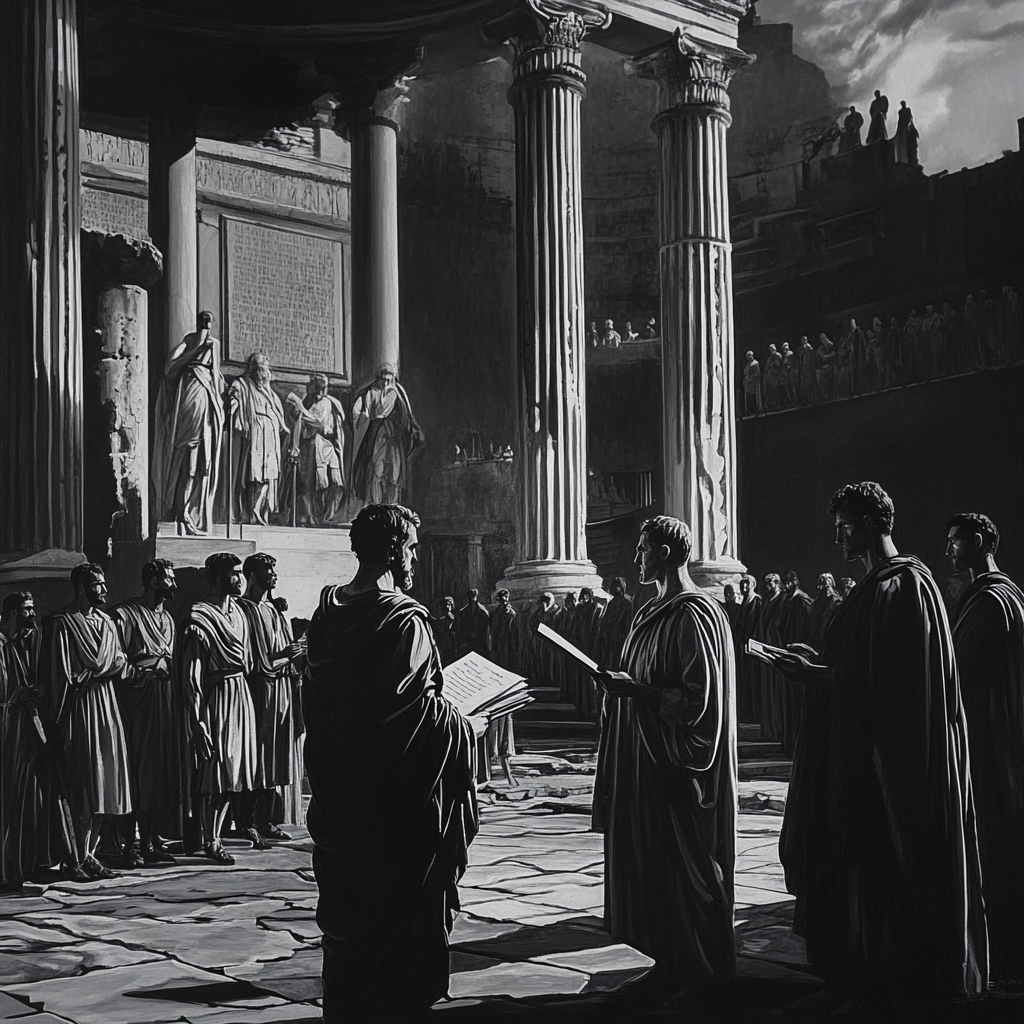Roman Ethics and the Virtuous Life
Roman philosophy, especially during the height of the Roman Republic and the Roman Empire, was deeply concerned with questions of ethics and the virtuous life. Roman thinkers inherited much from Greek philosophy, particularly Stoicism and Epicureanism, and adapted these ideas to address the practical realities of Roman life—politics, warfare, governance, and public duty. The Roman ethical tradition emphasized the cultivation of virtue, the importance of duty to the state and society, and the pursuit of a balanced, harmonious life.
At the heart of Roman ethics was the belief that a virtuous life was essential not only for individual happiness but also for the stability and prosperity of society as a whole. Philosophers like Cicero, Seneca, and Marcus Aurelius explored how individuals could cultivate moral character and contribute to the common good. Their teachings provide timeless lessons on personal integrity, responsibility, and moral leadership.
The Four Cardinal Virtues
Roman ethics, influenced by both Greek philosophy and Roman traditions, often focused on the development of key virtues that were essential for both personal morality and public service. These four cardinal virtues were central to the Roman understanding of the virtuous life:
- Prudence (Wisdom): The ability to judge correctly what is right and wrong and to act accordingly. For the Romans, prudence was the cornerstone of good decision-making, both in personal life and in governance. It involved foresight, rational thinking, and the ability to weigh consequences before taking action.
- Justice: The virtue of fairness and giving each person their due. Roman thinkers emphasized the importance of justice in both personal conduct and public life. Justice ensured that individuals treated others with respect and equity, and it was seen as essential for maintaining the order and stability of the state.
- Fortitude (Courage): The virtue of enduring difficulties with resolve and bravery. Fortitude allowed individuals to face challenges, adversity, and fear with strength, particularly in the context of warfare or public duty. For the Romans, courage was not only physical but also moral — the ability to stand up for what is right, even in the face of opposition.
- Temperance (Moderation): The virtue of self-control and restraint. Temperance involved moderation in all things, from physical desires to emotions and ambitions. It encouraged individuals to avoid excesses and maintain balance in their lives.
These four virtues provided the foundation for Roman ethical thinking and were considered essential for achieving eudaimonia, or flourishing, in both personal and communal life.
Stoicism and Roman Ethics

One of the most influential philosophical schools in Roman ethics was Stoicism, which had been founded by the Greek philosopher Zeno of Citium but was embraced and adapted by the Romans. Stoicism emphasized living in accordance with nature and reason, and it taught that the path to a virtuous life lay in developing inner strength and self-control, regardless of external circumstances.
Key Principles of Stoic Ethics
- Living in Accordance with Nature: For the Stoics, living in accordance with nature meant recognizing the rational order of the universe and aligning one’s life with it. This included accepting what cannot be changed and focusing on cultivating virtue, which was seen as the only true good.
- Control and Acceptance: The Stoics made a key distinction between what is within our control (our thoughts, actions, and responses) and what is outside our control (external events, the actions of others, and fate). They believed that by focusing on what we can control and accepting what we cannot, we can achieve tranquility and peace of mind.
- Virtue as the Only Good: In Stoicism, external goods such as wealth, power, and health are considered indifferent — they are neither good nor bad in themselves. The only true good is virtue, and the only true evil is vice. A virtuous person is someone who lives with wisdom, justice, courage, and temperance, regardless of their external circumstances.
Philosophy as a Guide for Public Life
Roman Stoics: Seneca and Marcus Aurelius
Seneca (4 BCE – 65 CE), one of the most famous Roman Stoic philosophers, wrote extensively on how individuals can cultivate virtue and maintain inner calm in the face of life’s challenges. In his essays and letters, Seneca explored the importance of self-discipline, rational thought, and emotional control. He believed that by mastering one’s emotions and desires, one could achieve tranquility and live in harmony with nature.
Marcus Aurelius (121–180 CE), the Roman emperor, is another key figure in Stoic ethics. His personal reflections, collected in his work Meditations, provide insights into how he applied Stoic principles to both personal and public life. As emperor, Marcus Aurelius believed that living virtuously meant fulfilling one’s duties to the state and acting with justice and reason, even in the face of immense political challenges.
Epicureanism and Roman Ethics
While Stoicism was more widely adopted in Roman political life, Epicureanism also played a role in shaping Roman ethical thought. Founded by Epicurus, this philosophy taught that the purpose of life was to achieve happiness through the pursuit of pleasure — not through indulgence, but through moderation and the cultivation of simple pleasures.
Key Principles of Epicurean Ethics
- Ataraxia (Tranquility): The ultimate goal of life for Epicureans was ataraxia, a state of inner peace and freedom from fear. Epicureans believed that by avoiding unnecessary desires, fears (especially the fear of death), and pain, individuals could live a tranquil life.
- Pleasure as the Highest Good: Epicureans believed that pleasure is the highest good, but they emphasized intellectual and emotional pleasures over physical indulgence. True happiness, they argued, comes from fulfilling basic needs, forming meaningful friendships, and living a simple, self-sufficient life.
- Moderation and Self-Sufficiency: Like the Stoics, the Epicureans advocated for moderation in all things. By limiting one’s desires and avoiding the pursuit of wealth, power, and fame, individuals could avoid the anxiety and dissatisfaction that often accompany these goals.
Lucretius and Roman Epicureanism
In Roman thought, the Epicurean philosophy was popularized by the poet Lucretius in his work De Rerum Natura (On the Nature of Things). Lucretius argued that the world operated according to natural laws, free from divine intervention, and that by understanding these natural principles, individuals could live free from fear of the gods or death. His work reinforced the Epicurean belief that rational understanding and moderation lead to a happy life.
Cicero: Virtue and Public Service
Though not strictly a Stoic or an Epicurean, Cicero (106–43 BCE) was one of Rome’s greatest philosophers and statesmen, and his ethical thought was deeply influenced by both schools of philosophy. In his works such as On Duties (De Officiis) and On the Republic (De Re Publica), Cicero explored how philosophical principles could guide public service and moral leadership.
Civic Virtue and Responsibility
For Cicero, the purpose of philosophy was to guide individuals in fulfilling their civic duties. He believed that the true measure of virtue was one’s commitment to the common good and the welfare of the state. Cicero argued that leaders and citizens alike had a moral responsibility to act with justice, integrity, and moderation, ensuring that their actions served the greater good.
Cicero’s philosophy emphasized the importance of balancing personal ethics with public duty. He believed that those in positions of power had an obligation to govern wisely and fairly, guided by moral principles. For Cicero, virtue was not just a private matter but a public responsibility.
Roman Ethics and the Common Good
The Roman approach to ethics was deeply intertwined with the idea of the common good. Roman philosophers and statesmen believed that virtue was not only about personal morality but also about contributing to the well-being of society as a whole. This sense of duty to the state and to others was a cornerstone of Roman ethics, shaping their views on leadership, law, and public life.
Natural Law and Justice
Roman thinkers like Cicero developed the concept of natural law, the idea that there are universal principles of justice and morality based on human reason and nature. According to Cicero, just laws were those that reflected these higher moral truths, and leaders had a duty to ensure that their laws served the common good and respected the rights of all citizens.
Conclusion: The Virtuous Life in Roman Ethics
Roman ethics emphasized the importance of virtue, duty, and the common good in both personal and public life. Whether through the Stoic pursuit of self-control and moral integrity, the Epicurean focus on tranquility and moderation, or Cicero’s call for ethical leadership, Roman philosophers believed that living a virtuous life was essential for both individual happiness and the stability of society.
By cultivating virtues such as wisdom, justice, courage, and temperance, and by committing oneself to the well-being of the community, Roman thinkers offered a powerful model for how individuals can lead meaningful, ethical lives.

